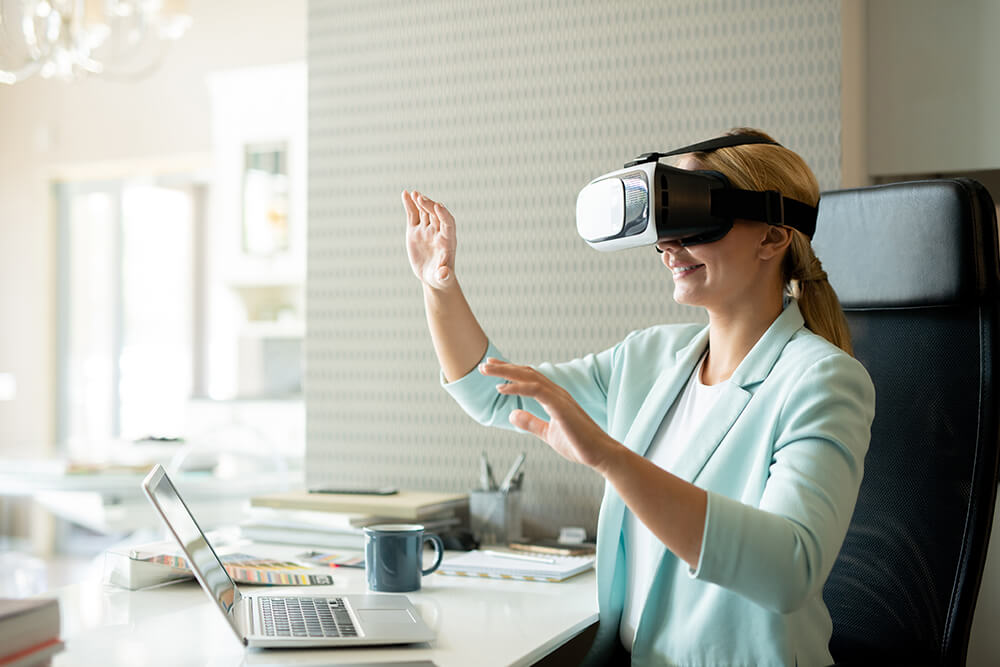These 3 Business Functions Could Be Transformed By VR
2 July 2021
Is virtual reality (VR) finally going mainstream? The availability of affordable, consumer-friendly VR headsets like Oculus Go would certainly suggest so. But what I find really encouraging is the increasing use of VR outside the realms of gaming and entertainment. All types of businesses are enthusiastically embracing VR. For me, seeing businesses get behind a technology trend is a sure sign that it’s tipping over into the mainstream.

As the world of gaming has shown us, VR can be used to create incredibly realistic digital encounters. For businesses, this offers the opportunity to create highly immersive experiences for customers and employees. To put it another way, VR gives businesses exciting new ways to connect with people, and this could be used to enhance a number of business processes.
Here are three business functions that could be optimised or even completely transformed through the use of VR.
1. Marketing
Good marketing is all about being able to communicate your product or service and connect with people. VR offers a chance to rethink how businesses do this. For example, when it comes to showcasing a product, we no longer need a physical showroom or demonstration in order to wow customers. By putting on a VR headset, a customer can be transported to a virtual showroom where they can interact with products and salespeople (whether digital representations of real company employees or AI-driven constructs).
Honda was an early adopter of VR marketing, creating VR experiences that allow car enthusiasts to view a new model and experience a virtual test drive – on a race track! VR is also making waves in the travel industry. Hospitality company St Giles Hotels has used VR to show potential guests the attractions and experiences they can find right on the doorstep of St Giles hotels around the world. This lets travellers immerse themselves in a new place (taking the guesswork out of whether a holiday destination is right for you), while cleverly underlining how ideally located St Giles properties are. In other words, why tell customers that your hotel is located just a few metres from the beach, when you can show them?
2. Training
The immersive nature of VR makes it a useful tool in learning and development. If you can simulate an environment or situation on a computer, you can create a very realistic – yet totally safe – space in which to monitor and learn from people’s actions. This could be particularly transformative in sectors like medicine or the military, where it’s far safer to simulate something than put a trainee (and patient, if it’s a medical trainee) through a high-risk, real-life training scenario.
That’s exactly what the Children’s Hospital in Los Angeles (CHLA) did when they created a VR-based training solution for paediatric surgeons. Working with VR specialists BioflightVR and AiSolve, CHLA created an operating simulation so detailed, it even included digital representations of the hospital’s real nurses. This means the trainee surgeons’ virtual experience matches what they would encounter in the real-life operating theatre. But VR isn’t just useful for simulating life-and-death scenarios. In another example, the Training Centre of Air Conditioning and Heating in Houston launched an immersive learning experience that gives trainee HVAC technicians “hands-on” experience in a digital lab.
3. Recruitment
A range of recruitment processes can be enhanced through VR. Imagine, for example, a VR-based assessment centre that simulates real-life situations that candidates are likely to encounter in the job (situations that can’t be recreated in an interview environment). That’s an area in which Lloyds Banking Group – one of the early adopters of VR-based assessment – has been leading the way. In a Lloyds VR assessment centre, candidates put on VR goggles and are transported to a digital environment where they work through a range of workplace scenarios.
VR can also be used to enhance your employer brand. Few people know the name of foodservice company Compass Group – even though it’s a huge employer with over 500,000 employees – and this lack of brand awareness proved a challenge when trying to attract fresh graduate talent. To help overcome its image (or lack-of-image) problem, the company created a VR experience for campus events that lets students take a virtual tour of the workplace and participate in a video interview.
We’re all leading increasingly digital lives. Now more than ever, the way people connect with businesses is taking place in a digital, rather than a physical, environment. VR offers a way to make those digital connections all the more realistic, immersive, and meaningful. In the future, I expect it to transform and enhance many business processes, not just marketing, training, and recruitment.
Related Articles
5 Business Trends Every Company Must Prepare for in 2026
By now, “smart” versions exist of just about every home appliance, gadget and gizmos we can think of. However, manufacturers continue[...]
Technology in Action: My Key Takeaways on How AI and Quantum Are Accelerating Global Transformation
By now, “smart” versions exist of just about every home appliance, gadget and gizmos we can think of. However, manufacturers continue[...]
8 AI Ethics Trends That Will Redefine Trust And Accountability In 2026
By now, “smart” versions exist of just about every home appliance, gadget and gizmos we can think of. However, manufacturers continue[...]
Why The AI Supercycle Will Fail Without Advanced Networks
By now, “smart” versions exist of just about every home appliance, gadget and gizmos we can think of. However, manufacturers continue[...]
The Two-Tier AI Economy: Why Half Of Companies Are Being Left Behind And How To Close The Gap
By now, “smart” versions exist of just about every home appliance, gadget and gizmos we can think of. However, manufacturers continue[...]
5 AI-Era Skills Mistakes That Will Cost Your Business Millions In 2026
By now, “smart” versions exist of just about every home appliance, gadget and gizmos we can think of. However, manufacturers continue[...]
Sign up to Stay in Touch!
Bernard Marr is a world-renowned futurist, influencer and thought leader in the fields of business and technology, with a passion for using technology for the good of humanity.
He is a best-selling author of over 20 books, writes a regular column for Forbes and advises and coaches many of the world’s best-known organisations.
He has a combined following of 4 million people across his social media channels and newsletters and was ranked by LinkedIn as one of the top 5 business influencers in the world.
Bernard’s latest book is ‘Generative AI in Practice’.










Social Media